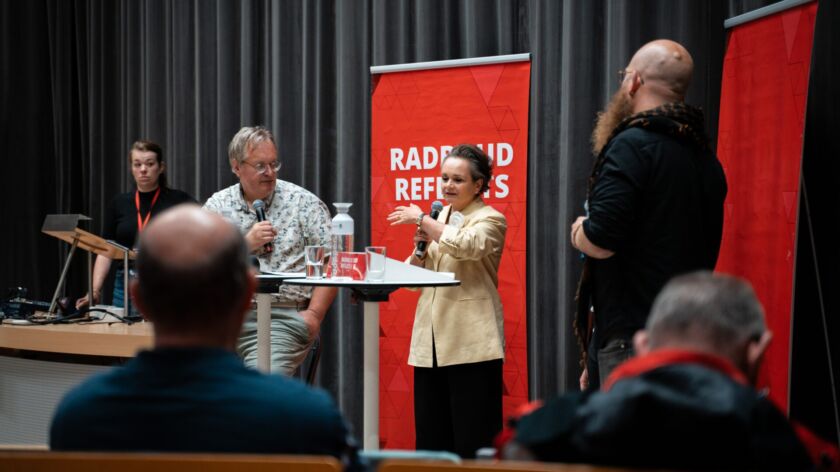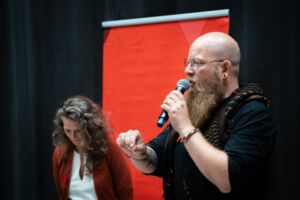University cuts are going to hurt, and it remains to be seen how much
-
 Alexandra van Huffelen in gesprek met Cees Leijenhorst, Suzanne Boelens en Mathijs van de Sande. Foto: Johannes Fiebig
Alexandra van Huffelen in gesprek met Cees Leijenhorst, Suzanne Boelens en Mathijs van de Sande. Foto: Johannes Fiebig
‘Painful’, ‘difficult but possible’ and ‘harmful’. These were some of the words used to describe the cutbacks at Radboud University during a meeting on campus this afternoon. Debate, emotions and hefty oppositions remained largely absent.
More than 100 staff members and students had gathered in the Lecture Hall complex during the lunch break for a lecture on the budget cuts at Radboud University. Despite the sensitive topic, the meeting remained businesslike – also during the Q&A session.
Although President of the Executive Board Alexandra van Huffelen noted several times how in agreement the speakers were, they did differ in their opinions on how to deal with the cuts in the coming period. The other participants in the debate were Suzanne Boelens, director of the savings programme and Mathijs van de Sande, political philosopher and Works Council member.
Cut
The meeting concerned the €55 million that the University needs to save in the period up to 2030. Cutting where there is ‘absolutely the least’ pain, cutting back on support services and making teaching and research more efficient, are the measures being taken to achieve this, as Alexandra van Huffelen explained. The President of the Executive Board also wants to focus on generating more revenue through student recruitment and alternative grants.

For some support services (HR and ICT & library services), it will already be clear this autumn what the cuts will mean for individual employees. The remaining staff will not get clarity until early 2026, as programme director Boelens revealed.
Actions
The possibility was also discussed that the education cuts imposed by the government could be reversed or reduced in a new cabinet term. Political philosopher Mathijs van de Sande, who is also a member of the Works Council, stressed that the Executive Board could have done more to promote actions against the cuts. ‘When several sectors that are affected by budget cuts act together in a single action, it has more impact than separate actions,’ Van de Sande said.
‘Just call a strike a strike. And don’t lean on the initiative of employees’
‘Just call a strike a strike. And don’t lean on the initiative of employees, but also undertake things yourself. For example, by including primary and secondary education in these kinds of actions,’ Van de Sande advised the President of the Board. The latter said she was in favour of collective action, especially in the run-up to the elections and also during the cabinet formation. ‘If they don’t hear from you in The Hague for a while, they forget about you.’
Lower quality
The impact of the cuts was discussed in different terms. According to Van de Sande, it should be made clear that cutting spending would lead to reduced quality in teaching and research. Although Van Huffelen said she agreed with him, she used different words.
Wise choices have to be made together, processes have to be more efficient, with more teaching and less research, and the cuts will definitely have an effect, Van Huffelen said. In response to a question from the audience, she indicated that Radboud University will remain a broad university and that small study programmes can continue to exist if they work well together.
Suzanne Boelens spoke from her position about the cuts being ‘difficult but possible’. Mathijs van de Sande, on the other hand, concluded once again that ‘when you weigh it all in, these cuts are ultimately impossible to realise’.



